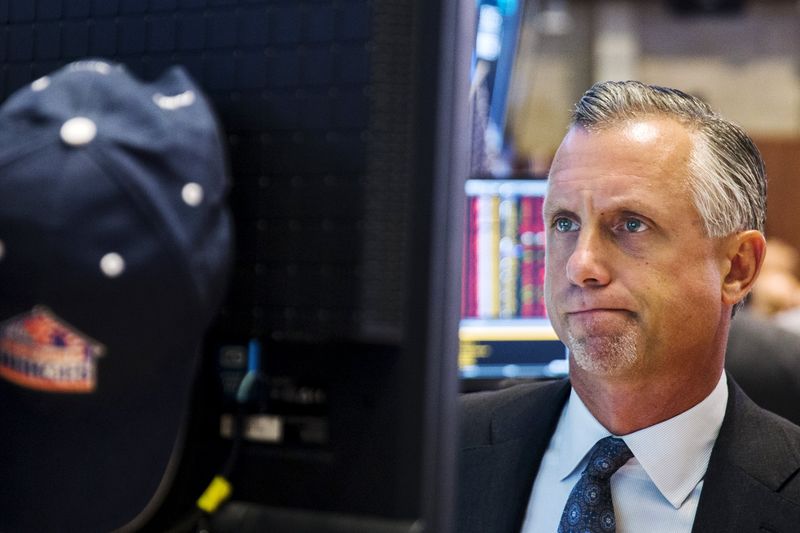Bill Gross warns on gold momentum as regional bank stocks tumble
* Share price recovery hit by latest Trump trade tweets
* Govt bond yields rise after surprise German SPD elections
* Oil prices climb before possible OPEC+ cuts
* Graphic: World FX rates in 2019 http://tmsnrt.rs/2egbfVh
By Tommy Wilkes
LONDON, Dec 2 (Reuters) - Stock markets reversed earlier
gains on Monday after U.S. President Donald Trump said he would
restore tariffs on some imports from Brazil and Argentina,
overshadowing data showing that the Chinese and euro zone
economies were stabilising.
European stocks had initially rebounded towards four-year
highs, as decent manufacturing data in China and renewed
optimism over a trade deal between Washington and Beijing
eclipsed last week's jitters. The positive mood also encouraged
investors to dump government debt in the euro zone and the
United States.
Trump then accused Brazil and Argentina of a "massive
devaluation" of their currencies and said he would immediately
restore tariffs on U.S. steel and aluminium imports.
The MSCI world equity index .MIWD00000PUS , which tracks
shares in 47 countries, gave up its earlier gains but clung to
positive territory and remained near last week's highs.
In Europe, the Euro STOXX 600 .STOXX slipped after earlier
rising 0.3 percent. The German DAX .GDAXI succumbed to selling
pressure. French .FCHI and British .FTSE shares were also in
the red.
Wall Street futures, however, remained in positive territory
ESc1 .
Investors have been sticking with the broad view that a
further escalation in the trade war between China, the U.S. and
other countries can be avoided, even after last week's decision
by Trump to sign legislation backing protesters in Hong Kong,
which enraged China.
Stock markets headed back towards record highs in November
as investors bet the worse of the trade war had passed and a
fears of a recession receded.
Chinese data did much to help the initial mood on Monday.
The Caixin/Markit Manufacturing Purchasing Managers' Index (PMI)
in November marked its fastest expansion since December 2016.
"What we had in China on the weekend with the two PMIs being
above expectation is clearly a good sign in terms of making the
global stabilisation scenario more credible," said Francois
Savary, chief investment officer at Swiss wealth manager Prime
Partners.
Another PMI survey published on Monday showed euro zone
manufacturing activity shrank for a 10th consecutive month in
November, but it also signalled that the worst may be over.
Savary cautioned that while we do have signs of "economic
stabilisation" and a decreased risk of deflation, "a lot of
positive news has been priced in".
GERMAN ELECTIONS
Some of the most striking moves in global markets on Monday
were in government bonds, where the strong economic numbers and
election of new political leaders in Germany prompted a selloff
in safe-haven government debt.
The surprise election of new leftist leaders to the Social
Democrats (SPD) threatened Germany's ruling coalition, sparking
a jump in German bond yields as markets bet it would ease the
path towards fiscal expansion. The 10-year German bond yield rose more than 7 basis points
to as strong as -0.273 percent DE10YT=RR , a three-week high.
U.S. Treasury yields were also notably higher, with the
10-year bond yield up by more than 7 basis points at a two-week
high US10YT=RR .
The buoyant mood among investors was also evident in the
U.S. dollar, which has tended to perform well on hopes for a
trade deal.
It rallied to a six-month high of 109.73 yen JPY=EBS , its
strongest against the safe-haven Japanese currency since May,
before settling at 109.54 after Trump's tariff announcement.
Currency markets were largely quiet elsewhere, with the euro
down marginally against the dollar at $1.1005 EUR=EBS .
Markets are now focused on the U.S. Institute for Supply
Management's November manufacturing survey, which is due at 1500
GMT, for a further gauge of the health of the U.S. economy,
followed later in the week by closely watched jobs data.
"The onus is now on the ISM data to see if there is a
rebound, and the odds are on a bit of rebound but not a strong
one," said Sebastien Galy, senior macro strategist at Nordea
Asset Management.
Oil prices recovered after slumping on Friday on record high
U.S. crude production. Expectations that OPEC and its allies are
set to extend existing cuts in oil output when they meet this
week helped drive the rebound. Brent crude LCOc1 futures extended earlier gains to $61.99
a barrel, up 2.48 percent. U.S. West Texas Intermediate crude
CLc1 gained 2.52 percent to $56.56 per barrel.
MSCI world stocks index https://tmsnrt.rs/2qVb6hu
^^^^^^^^^^^^^^^^^^^^^^^^^^^^^^^^^^^^^^^^^^^^^^^^^^^^^^^^^^^>
